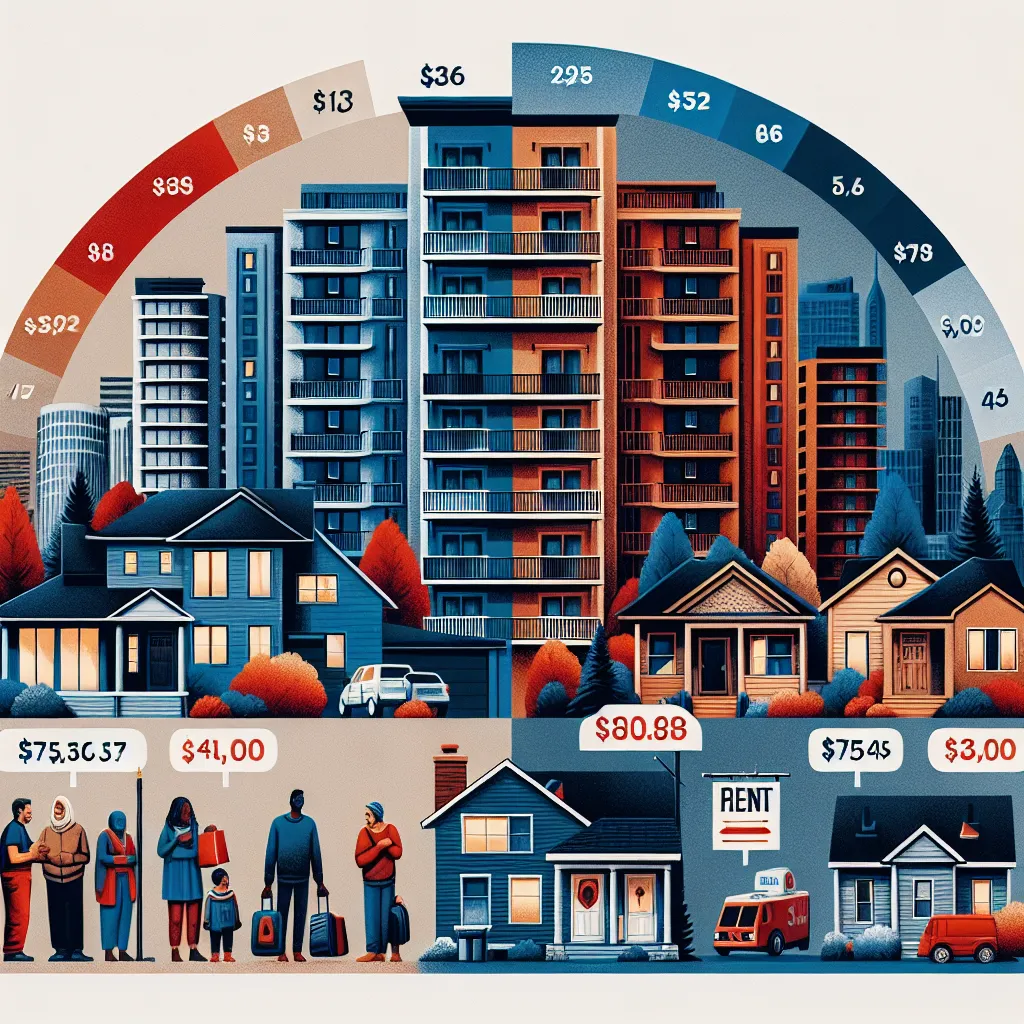Moving to a new country can be both exciting and daunting. One of the biggest concerns for new immigrants in Canada is understanding the housing market and figuring out the average house rent in Canada per month. Let’s break it down and explore the diverse options available, ensuring you find the right fit for your budget and lifestyle.

Finding the Right Place to Live
Canada offers a variety of living environments, from bustling urban centers to serene rural areas. Determining where to live depends on your personal preferences and financial situation. Whether you are looking for a vibrant city life or a peaceful suburban setting, Canada has something for everyone.
Major Cities vs. Smaller Towns
In major cities like Toronto, Vancouver, and Montreal, the cost of renting can be quite high. For example, a one-bedroom apartment in downtown Toronto could cost you around CAD $2,280.60 per month, while the same in a smaller city like Winnipeg would be significantly lower. Here’s a snapshot of average rents:
| City | 1-Bedroom Apartment (CAD) | 3-Bedroom Apartment (CAD) |
|---|---|---|
| Toronto | $2,280.60 | $3,434.43 |
| Vancouver | $2,240.70 | $3,791.40 |
| Montreal | $1,221.81 | $1,979.26 |
| Calgary | $1,509.55 | $2,386.41 |
| Winnipeg | $1,278.64 | $1,914.05 |
Breaking Down the Costs
Understanding the breakdown of costs can help you budget more effectively. Apart from rent, there are several other monthly expenses to consider.
Utilities
Utilities in Canada are generally reasonable, but they can vary depending on the province. On average, you can expect to pay around CAD $284.83 per month for basic utilities, including heating, electricity, water, and garbage services. Internet costs approximately CAD $85.81 monthly.
Grocery Expenses
Grocery prices in Canada can add up, especially if you’re accustomed to lower prices in your home country. Here’s a look at some common grocery items and their average costs:
| Item | Cost (CAD) |
|---|---|
| Milk (1 gallon) | $10.68 |
| Bread (1 lb) | $3.02 |
| Rice (1 lb) | $2.02 |
| Eggs (12) | $4.35 |
| Chicken (1 lb) | $6.89 |
Overall, the average monthly grocery bill for a family can be around CAD $323.04.
Transportation
Public transportation is a convenient and cost-effective way to navigate Canadian cities. The average cost of a monthly public transit pass is around CAD $105.64. Here’s a look at some city-specific costs:
| City | Monthly Pass Cost (CAD) |
|---|---|
| Toronto | $156.00 |
| Vancouver | $104.90 |
| Montreal | $97.00 |
| Calgary | $112.00 |
| Halifax | $82.50 |
Healthcare and Insurance
While Canada offers public healthcare, many residents opt for additional private health insurance to cover services not included in the public plan. The average cost for employer-sponsored health insurance is around CAD $63.00 per month.
Entertainment and Dining
Canada is rich in cultural activities and dining options, but these can vary in cost. A meal at a mid-range restaurant will set you back approximately CAD $45.00, and a cinema ticket costs around CAD $15.00. Including occasional dining out and entertainment, you might spend around CAD $94.46 monthly.
Total Monthly Costs
Combining all these expenses provides a clearer picture of the monthly cost of living in Canada. Here’s a summary table:
| Category | Monthly Cost (CAD) |
|---|---|
| Rent (1-bed apt outside city) | $1,464.67 |
| Groceries | $323.04 |
| Utilities (incl. Internet) | $284.83 |
| Transit Pass | $105.64 |
| Entertainment and Dining | $94.46 |
| Health Insurance | $63.00 |
| Total | $2,335.64 |
Utilizing Technology for Property Search
Finding the right rental property can be time-consuming, but platforms like AnySqft make the process seamless. By utilizing AI-driven insights, AnySqft matches you with properties that fit your needs and budget, ensuring a hassle-free experience.
Conclusion
Renting a house in Canada can vary greatly based on location and lifestyle preferences. By understanding the breakdown of costs and leveraging advanced tools like AnySqft, you can find the perfect place to call home without breaking the bank. Happy house hunting!